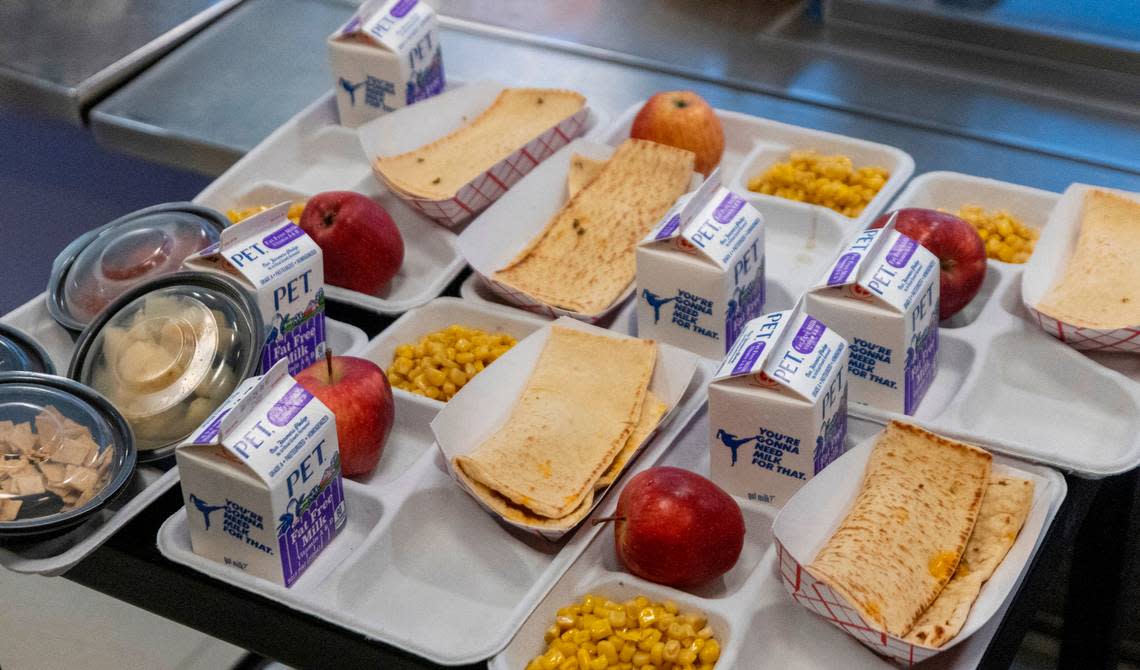‘Feed these babies so they can learn and not be hungry’: Wake debates student lunch debt

Thousands of Wake County students have had their lunches publicly taken away from them this school year because they didn’t have enough money to pay for them.
Multiple Wake County school board members said Tuesday that it’s wrong how so many students are being required to receive a meal of only fruits and vegetables because they can’t afford a regular meal. Board members asked staff to look for ways to reduce how often meals are taken away from students.
Options discussed Tuesday include allowing students to have a larger unpaid meal balance and creating a district-wide fund that people can donate money to in order to help cover meal costs.
“Feed these babies so they can learn and not be hungry during the day,” school board member Toshiba Rice said at Tuesday’s policy committee meeting.
The board is expected to have further discussion of its unpaid meals policy.
Unpaid meal debt balances
School meal programs are required by federal law to be self-supporting. Last school year, the district paid $23,000 to cover unpaid student meal debt.
To minimize meal debt, Wake limits students to having an unpaid balance of three days of meals. Paula De Lucca, Wake’s senior director for Child Nutrition Services, said 3,500 students currently have an unpaid meal balance for a total of $19,000.
“Three days is still a little touch-and-go for a lot of families that would actually need it,” Rice said. “We’re not talking families that pack their kids’ lunch every day and can afford to put $50 on their account and just re-up it every time. We’re talking vulnerable families.”
Are fruits and veggies enough?
When the three-day limit is reached, students who are trying to buy regular school meals are given a meal of only fruits and vegetables.
The alternate meal was served 8,000 times this school year, according to De Lucca. She said Wake used to serve 70,000 alternate meals a school year when it didn’t allow students to have any unpaid meal debt.
The fruits and vegetables are “nutrient dense,” De Lucca said.
But board member Cheryl Caulfield said students need to get protein in their meals. Caulfield said they need to get a full meal because “I don’t see how having green beans and apples” are enough.
“We need to get them to school,” Caulfield said. “We need to have teachers to teach them, and they need to have food in their stomachs. All three of those makes everything else not important.”
Publicly shaming students
If a student doesn’t have money, cafeteria cashiers are supposed to handle the situation out of sight of other students. But Rice said that’s not often the reality.
“The stories are heartbreaking,” Rice said. “Families are constantly coming to school and children being told in public in a not-so kind way give that (meal) back.”
Cashiers are supposed to see whether the student has a sibling they can transfer funds from or whether they can ask a parent to electronically send more money to the account.
“I absolutely understand about a kid coming through the line and having their meal taken away,” said Superintendent Robert Taylor. “I think there are tons of things we can do to mitigate that to where that doesn’t happen.”
Angel funds to help students
Another option is for cashiers to see whether schools have an “angel fund” they can tap into to cover meal costs.
Districtwide, schools have around $39,000 in their angel funds, according to De Lucca. Some schools have pretty sizable balances, but De Lucca said 50 schools have no money in their accounts. She said another 40 to 50 schools have $25 or less in their angel fund.
That $39,000 isn’t shared among schools. In some cases, De Lucca said donors have specified that their money should only be used for a specific school.
De Lucca said she has been looking into the issue of creating a districtwide angel fund. Board members told her Tuesday to push ahead on the idea.
Taylor said if the board wants to create a districtwide angel fund, expand the three-day unpaid meal balance limit or find some other way to cover meal costs, then staff would do so.
“If the board has the desire to remove these kinds of barriers, that’s we’ve got to work toward,” Taylor said.


